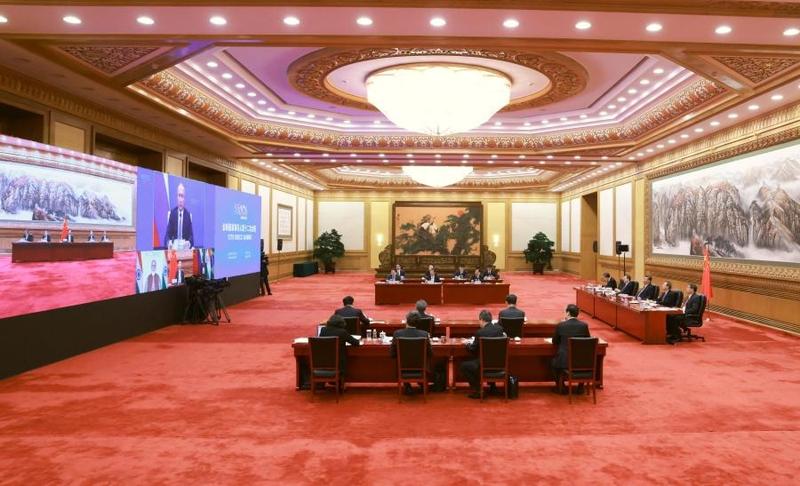 Chinese President Xi Jinping attends the 12th BRICS summit via video link in Beijing, capital of China, Nov 17, 2020. (DING LIN/XINHUA)
Chinese President Xi Jinping attends the 12th BRICS summit via video link in Beijing, capital of China, Nov 17, 2020. (DING LIN/XINHUA)
Chinese President Xi Jinping’s speech at the 12th BRICS Summit showed the world a blueprint of the emerging-market bloc, experts say.
Rajiv Biswas, Asia Pacific chief economist for global consultant IHS Markit, said Xi had delivered a speech in which the future of BRICS was well laid out.
Addressing the summit in Beijing via video link on Tuesday, Xi called on the BRICS countries to uphold multilateralism, and safeguard peace and stability in the world. He also said countries need to pursue openness and innovation to promote global economic recovery.
READ MORE: BRICS strategy to accelerate global economic recovery
BRICS groups Brazil, Russia, India, China and South Africa. The meeting was hosted by Russia, which holds the rotating BRICS presidency this year.
The BRICS economic cooperation agenda has broadened significantly in recent years, including the infrastructure project lending program of the New Development Bank (NDB) that was founded by the BRICS members, Biswas noted. NDB, headquartered in Shanghai, formally opened in July 2015.
Beyond the joint economic cooperation initiatives among the BRICS countries, the group has engaged with other countries to provide global leadership for the wider grouping of developing countries, he said.
Xi’s comments about “upholding multilateralism” was worth noting, said Tim Harcourt, J.W. Nevile Fellow in Economics at the University of New South Wales Business School
"Therefore, it is to be hoped that the long-term economic development vision and commitment to multilateral cooperation under the umbrella of the BRICS Forum will prevail among the BRICS member nations despite geopolitical differences that arise between some BRICS members,” said Biswas.
Despite geopolitical tensions, the participation of Indian Prime Minister Narendra Modi at the BRICS Summit “signals that the long-term benefits of the BRICS grouping remain an important common goal among the BRICS member nations," Biswas said.
Xi’s comments about “upholding multilateralism” was worth noting, said Tim Harcourt, J.W. Nevile Fellow in Economics at the University of New South Wales Business School.
Harcourt said the recent signing of the Regional Comprehensive Economic Partnership (RCEP), of which China is a member, gives the world “some hope for open regionalism and multilateralism”.
Signed on Sunday, RCEP is the biggest trade pact in the world. It is a trade agreement between 10 members of the Association of Southeast Asian Nations and its major trading partners China, Japan, South Korea, Australia and New Zealand.
During his speech, Xi called for international solidarity and cooperation to jointly cope with the challenges of the COVID-19 pandemic. He put forward proposals for the bloc to overcome global challenges including the pandemic and global economic recessions. He also said China will “actively consider providing vaccines to BRICS countries where there is a need”.
“The global problems have global solutions and no individual country is in a position to fight this kind of pandemic alone. So we all have to work together,” said Bilal Ahmad Butt, consul general of Pakistan in Hong Kong.
“President Xi Jinping is absolutely right that we all will have to come together to find a solution to the global problems.”
At the summit, Xi explained China’s “dual circulation” strategy, which aims to foster a new development paradigm under which domestic demand will be the economic pillar and the international and domestic circulations reinforce each other.
ALSO READ: Xi: China, BRICS partners working on COVID-19 vaccines
Noting “dual circulation” is a key focus in China’s 14th Five-Year Plan, the diplomat said Pakistan can be a good partner with the Chinese mainland and Hong Kong. “In the future, we can collaborate more in a number of areas,” he said.
He was speaking to China Daily on the sidelines of the Greater Bay Area Conference on Nov 18. The event was organized by China Daily and the Silk Road Economic Development Research Center in Hong Kong, with the Council for the Promotion of Guangzhou-Hongkong-Macao Cooperation as the co-organizer.
Contact the writers at kelly@chinadailyapac.com


